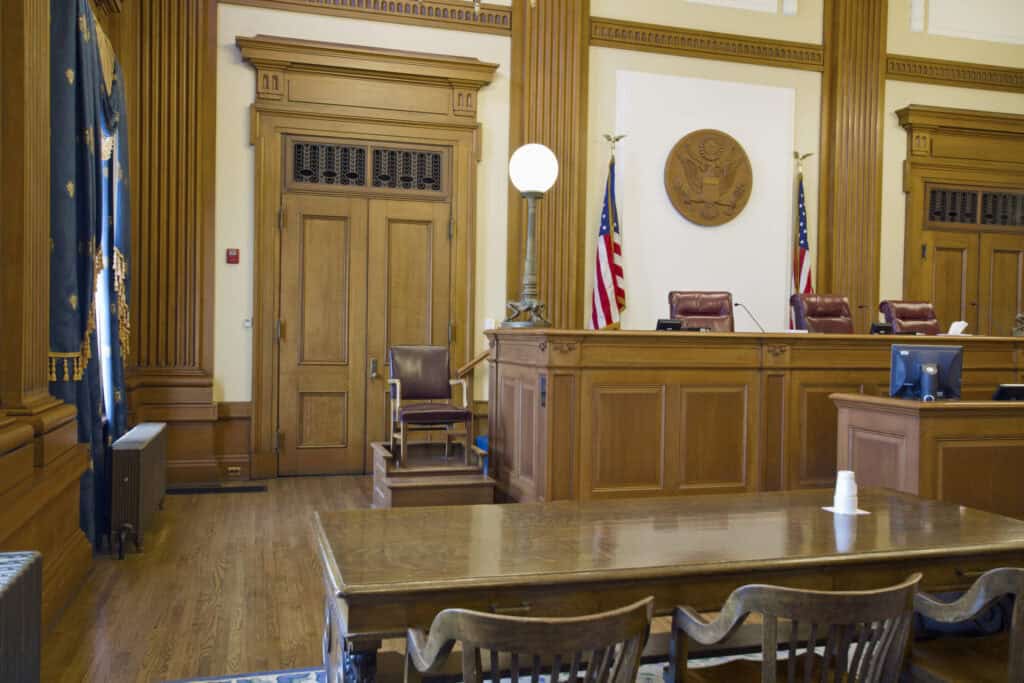When someone becomes involved in the federal legal system, it’s crucial to understand the steps, procedure, and potential outcomes, whether you’re the defendant, a witness, a plaintiff, or simply someone trying to understand the role of the federal courts. Gaining knowledge about how these courts work is essential. Understanding the courtroom setting, the roles of judges and prosecutors, the importance of each ruling, and how the courthouse functions as a central part of the justice process can help people better navigate this complex system.
Federal court proceedings are distinct from those in state courts, primarily because they operate under different jurisdictions, handle different types of cases, and follow their own rules, procedures, and laws. These courts have limited jurisdiction, meaning they only hear specific types of cases as authorized by the United States Constitution and federal statutes. Each appearance in federal court follows a structured menu of steps defined by law, overseen by a government organization committed to justice. Additionally, fees may be involved for filing documents or accessing certain court services.
This article from Lipp Law LLC walks you through the key steps, processes, and stages in a federal case. With support from experienced legal counsel, understanding the federal court process can help you better navigate a legal matter that might affect your rights, assets, reputation, and future.
Understanding Federal Jurisdiction
Federal courts have jurisdiction over certain types of cases, including:
- Violations of federal law
- Litigation involving the United States government
- Disputes between citizens of different states where the amount in controversy exceeds a statutory limit
- Constitutional challenges
- Admiralty and maritime cases
- Crimes committed on federal property
These courts interpret and apply federal laws, resolve state disputes, and address issues that impact national interests. Not every legal matter is eligible for federal court; state courts retain authority in most instances. Federal jurisdiction must be established for the court to proceed. Each section of the federal court system has a distinct role in ensuring justice. With a firm hand, judges guide proceedings in a way that reflects fairness and order. The experience of each person involved—whether as a party to the case or a witness—varies depending on the place and nature of the proceedings. Many turn to platforms like YouTube for simplified legal explanations, helping them understand the details of complex federal processes.
The Beginning of a Federal Case: Filing a Complaint or Indictment
Federal cases usually start with a civil complaint or a criminal indictment. In civil litigation, a plaintiff files a complaint alleging harm and seeking remedies. In criminal cases, a grand jury may issue an indictment based on evidence submitted by the prosecution.
In both situations, a docket is created. The court assigns a case number and manages deadlines, hearings, and related procedures. From this point forward, the case enters the formal process of federal court proceedings.
The magistrate judge may be the first judicial officer to review a new case. Their role includes handling initial hearings, pretrial motions, and procedural issues before the case reaches a district court judge.
Arraignment, Pleas, and Bail in Criminal Cases
The defendant will attend an initial appearance for criminal cases, usually within 72 hours of arrest. Here, the judge will inform the defendant of their rights and charges and ensure they have legal counsel. If the defendant cannot afford an attorney, the court will appoint one.
At this stage, a detention hearing may be scheduled. The court evaluates whether the defendant should remain in custody or be granted release. Factors include the severity of the crime, flight risk, potential danger to the public, and prior convictions.
If release is granted, bail terms are established, often including conditions like electronic monitoring, restrictions on travel, or other forms of supervised probation.
During arraignment, the defendant is asked to enter a plea—usually “guilty,” “not guilty,” or “no contest.” This begins the formal court proceedings and sets in motion the next steps.
The Pretrial Process: Evidence, Motions, and Strategy
Once a plea is entered, the pretrial process begins. This is one of the most active stages of a federal case, where both the prosecution and the defense prepare for trial.
Discovery and Information Exchange
The attorneys involved exchange information, review evidence, and gather testimony. This is known as “discovery.” Discovery may include:
- Police reports
- Medical or financial records
- Surveillance footage
- Witness testimony
- Expert analyses
The objective is to share all facts relevant to the case, ensuring neither side is unfairly surprised during the trial.
Motions and Legal Arguments
Both attorneys may file motions asking the court to rule on specific procedures or legal questions. Motions can seek to suppress specific evidence, dismiss charges, or compel additional information.
The judge—or sometimes a magistrate judge—rules on these motions, helping shape the trial strategy. Properly handling this stage is critical. Skilled legal counsel will aggressively challenge improper procedures or unfair advantages to protect their client’s rights.
The Trial Stage: Presenting the Case
When the case proceeds to trial, both sides can present arguments, submit evidence, question witnesses, and advocate for their clients.
Jury Selection
Federal trials may be decided by a jury or by a judge in a bench trial. For jury trials, a panel of peers is selected through a formal process called voir dire. Attorneys from both sides can challenge or approve potential jurors to ensure impartiality.
Presentation of Evidence
The prosecution opens the trial, presenting its case first. They aim to establish the defendant’s guilt “beyond a reasonable doubt.” This is the highest burden of proof in the American legal system. The prosecutor may use:
- Direct testimony from witnesses
- Physical or digital evidence
- Expert reports
- Surveillance videos
The defense then presents its case, challenging the evidence, questioning witnesses, and sometimes introducing its witnesses or testimony.
Closing Arguments and Verdict
After all evidence has been presented, both sides deliver closing arguments. Then, the jury (or judge) deliberates. Their verdict may be “guilty,” “not guilty,” or occasionally, a mistrial if no consensus is reached.
Sentencing and Post-Trial Proceedings
The judge will schedule a sentencing hearing if a “guilty” verdict is returned. During sentencing, both sides present arguments about the appropriate punishment. Factors include:
- Nature of the crime
- Prior convictions
- Impact on victims and society
- The level of cooperation by the defendant
- Federal sentencing guidelines
Possible sentences include prison, fines, probation, community service, or supervised release. The court may also impose asset forfeiture, requiring the defendant to surrender illegally obtained assets.
Appeals and Review of Court Proceedings
The defense can file an appeal if there are legal grounds to challenge the trial or verdict. The appeals process involves asking a higher court to review the original trial’s records, motions, and procedures.
The appellate court does not hear new evidence or witnesses. It only determines if legal errors occurred that might have influenced the outcome. Possible results of an appeal include:
- Upholding the conviction
- Reversing the verdict
- Ordering a new trial
- Modifying the sentence
An experienced attorney is crucial during the appeals process, as this stage requires a strong understanding of laws, procedures, and legal writing.
Special Considerations in Federal Court
Federal cases differ in complexity, and multiple parties are often involved, such as co-defendants, corporate entities, or government agencies. Due to the higher stakes and broader implications, federal courts tend to involve more detailed procedures and stricter adherence to timelines and rules.
Additionally, access to federal courthouses, forms, and legal support has improved thanks to official websites. These resources often display HTTPS and a lock icon to indicate secure data protection. They provide access to staff directories, public records, a list of vacancies, and self-help legal content.
Legal professionals use these tools regularly to ensure their practice is informed and up-to-date. The availability of digital information has also improved transparency and public access.
The Broader Impact of Federal Litigation

Federal litigation affects society, not just individuals. Significant rulings can redefine national laws, set precedents, and enforce accountability in powerful institutions.
For example, a federal lawsuit might lead to regulatory change, halt discriminatory practices, or recover millions of dollars in consumer damages. Federal prosecution often targets high-level offenses like white-collar crime, organized criminal networks, or cross-border illegal activity in criminal matters.
The outcome of a single federal case can have ripple effects, influencing policy, legal practice, and public perception.
Why Legal Representation Matters
The importance of competent legal representation, such as an experienced Criminal Defense Lawyer in Las Vegas, cannot be overstated at every stage of a federal case. The laws are complex, the procedures are rigid, and the impact of mistakes can be devastating.
Whether facing charges, pursuing a civil lawsuit, or defending your rights, having a knowledgeable lawyer protects your interests. An experienced attorney will help you understand your rights, present compelling arguments, evaluate evidence, and guide you through each step of the process.
At Lipp Law LLC, we understand that your case is not just a file—it’s your life, freedom, and reputation. We take our role seriously and are committed to delivering dedicated, professional legal services on your behalf.
Final Thoughts
Understanding what happens in federal court helps demystify a process that can feel intimidating. Each step plays a crucial role in ensuring fairness, due process, and justice from arraignment to sentencing.
Suppose you or someone you know is involved in federal court proceedings. In that case, acting quickly, gathering the correct information, and partnering with experienced attorneys who understand the federal court system is essential.
Let Lipp Law LLC be your trusted advocate. Contact us today to schedule a consultation, discuss your legal matters, and begin building a strong defense or assertive prosecution strategy for your federal case.
Frequently Asked Questions(FAQs)
What types of attorneys practice in federal court?
Federal court cases typically require attorneys admitted practicing in federal jurisdictions. These include federal public defenders, U.S. attorneys, and private defense or civil litigation lawyers experienced with federal procedures and laws.
Can I represent myself in federal court?
Individuals have the right to represent themselves (pro se) in federal court. Still, it is not recommended due to the complex procedures, strict deadlines, and potential consequences of legal missteps.
How long does a federal court case usually take?
The timeline varies widely. Simple civil cases may resolve in months, while complex criminal or multi-party litigation can last over a year. Appeals and pretrial motions may also significantly extend the timeline.
Is a federal court more serious than a state court?
Federal court often involves more severe charges, larger monetary disputes, and stricter sentencing guidelines. Penalties in federal criminal cases tend to be harsher, and cases often receive more scrutiny.
Are federal court proceedings public?
Most federal court proceedings are public, meaning the public can access trials and filings. However, certain records may be sealed, and security measures may limit in-person attendance in sensitive cases.
What is a U.S. Magistrate Judge, and how do they differ from District Judges?
A magistrate judge handles preliminary matters like arraignments, bail hearings, and some civil proceedings. District judges oversee trials and have broader authority, including issuing final rulings.
What happens if someone violates bail in a federal case?
Violating bail can lead to immediate arrest, release revocation, additional charges, and forfeiture of bail funds. The judge may impose stricter conditions or entirely deny future release.
What role do federal prosecutors play?
Federal prosecutors, also called Assistant U.S. Attorneys, represent the government in criminal cases. They evaluate evidence, present charges, negotiate plea deals, and argue in court on behalf of the United States.
Can a federal court case be settled out of court?
Yes. Civil cases are settled through negotiation, mediation, or arbitration before trial. Even in criminal cases, plea bargains can be reached to avoid lengthy court proceedings.
Do federal courts use the same rules across the U.S.?
While federal courts follow the Federal Rules of Civil and Criminal Procedure, each district may have its own local rules and customs. It’s essential to consult a lawyer familiar with the court where your case is filed.







